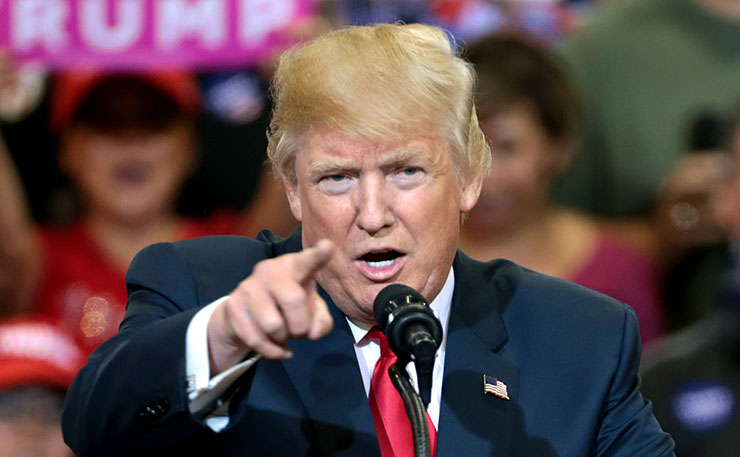There is a disease at the heart of the GOP, and its name is not Donald Trump. Despite Trump’s inadequacies, he represents the symptom, a grotesque, malignant symptom, but a symptom, nonetheless, not the disease. This cancer is systemic. The true sickness has been lurking in the shadows for far longer than the period of Trump’s candidacy and presidency. Stephen Keim SC and Luke Craske explain.
The Disease
There was once an era when it meant something to be a Republican. It meant to embrace the open market and defend one’s principles. This is not to say that the GOP of old was some shining beacon on a hill. Of course not: there are very real problems which arise from an uninhibited devotion to neoliberalism and, obviously, not everyone adheres to the same values. But the GOP stood for something. Beyond that, it admired intellectualism, fought for the rule of law, and respected the truth.
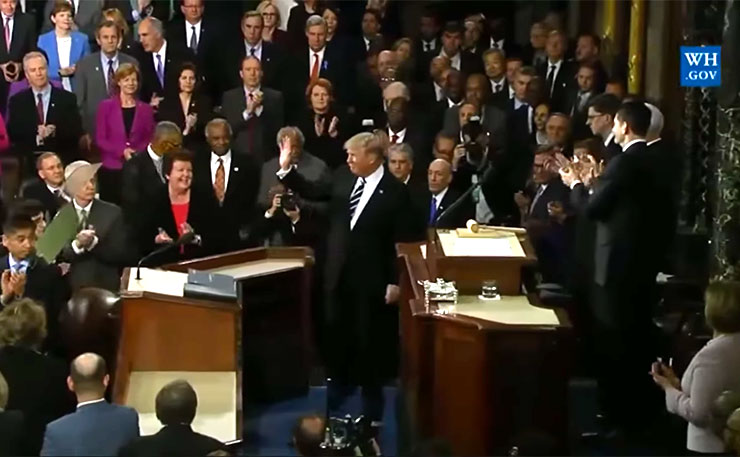
Those days are gone. Long gone is the party of Lincoln. Gone too is the party of Reagan and Bush. That GOP is dead. Now, it is the party that accepted and endorsed Trump. And for that party, free trade is deeply suspicious, principles are a commodity, intellectualism is deplorable, the rule of law is a threat, and the truth – and those who report it – are the enemy.
The Republican Party stands for two things now: cowardice and winning. The former is the last refuge of the Republican Old Guard, the so-called establishment. The latter is the singular pursuit of the new Trumpist faction, which wants nothing more than to start “winning” again in this world it thinks – rightly or wrongly – has left it behind.
These phenomena did not emerge overnight. They are the product of a long campaign by billionaires who, through financing radical right-wing groups, ideas and ways to incorporate them into mainstream politics, seek to shift public discourse to their benefit.
Cowardice
If the world has been shocked by the advent of Trump, it is disturbed by the lack of resistance within the Republican establishment to him. During the GOP Primaries race, partisan heavyweights lined up to denounce the seemingly unhinged businessman. Once Trump became the favourite to win the Republican nomination, such criticism died down. As President, Trump is now only publicly condemned by Republicans with a maverick bent, like John McCain, or those with nothing to lose, like Jeff Flake and Bob Corker, despite him destroying everything the GOP, once, stood for.
The silence from congressional Republicans is deafening. The reason for it is simple and shameful. They are afraid, cynical, and – perhaps above all – cowardly. They fear that, if they speak out against the madness – and in so doing risk the wrath of Trump’s supporters (fuelled by the money of the billionaires), it will be the end of their careers. Certain leaders within GOP ranks secretly delight at the chaos of Trump’s presidency, thankful for the smokescreen obfuscating the rushed implementation of the controversial items on their agenda, such as the unravelling of Obamacare and the ramming through of a fiscally unsound tax plan. It is this toxic mix of fear and cynicism from which their cowardice stems, and the unfortunate reality is that it will likely not be ameliorated in the current term of government.
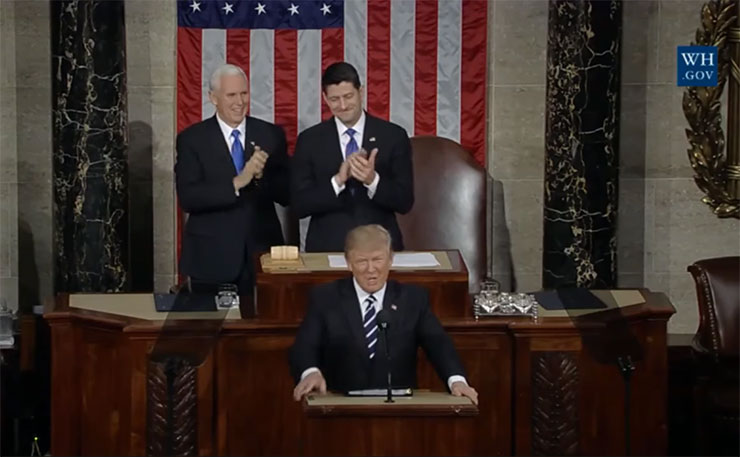
Cowardice, of course, is not a new issue in the Congressional GOP. For years the party has been either unable or unwilling to stand up to its donors and influential supporters. The GOP are unable to commence meaningful action to reduce gun deaths due to the disapproval of the NRA. They are likewise unwilling to implement measures to tackle climate change, lest they lose the backing of fossil fuel tycoons like the Koch brothers.
They have also proven unable to resist the demands of large corporations for the destruction of Medicaid and implementation of grossly disproportionate tax breaks – despite both measures being opposed by a majority of Republican voters. The Trump cabinet represents the greatest accumulation of wealth of any cabinet in American history. It is unsurprising that almost all cabinet members are representative of the powerful financial interests which have taken the GOP captive.
Of immediate concern is the impact the cowardice amongst the GOP is having upon Congress itself. The unwillingness to speak out has developed into astonishing tribalism within Republican ranks. Perhaps this is merely the next evolution of the hyper-partisanship which has enveloped Washington for years. But in any case, it is apparent that a common-sense approach to legislating has evaporated.
Bills are no longer evaluated on their strengths and weaknesses but through the lens of partisanship. Legislation is proposed because the other party hates it; legislation is opposed because it is the work of the other party. Partisanship begets partisanship and, thus, the issue is not endemic only to the GOP, but to the Democrats as well.
As a result, Congress is paralysed, and the cycle of pointless partisan warfare continues to spin with ever increasing rapidity.
Winning
The “Base”, as it is affectionately known in Trumpland, is one of the twin hearts of these issues. Predominantly white, straight, rural, male, Christian, and working class, fear and anger drive the Base. Their fear is an existential one – the world is changing, and they feel left behind. Throughout history, socially privileged groups have reacted to the redistribution of such privilege as if it were a personal attack. And, perhaps, to them it is. The reduction of inequalities often appears oppressive to those who claim superiority. The raising up of hitherto oppressed groups, inherently, diminishes the means by which those who depend on a feeling of superiority, can maintain that feeling. This remains true even when the divide is generated, in part, by outside forces.
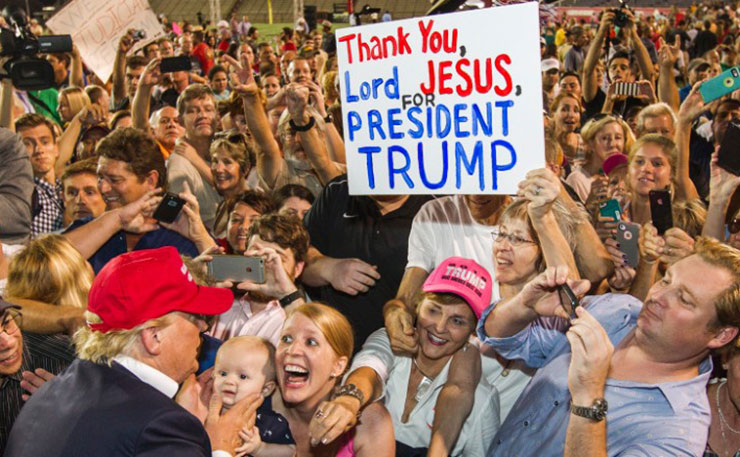
These straight white Christian men see their privilege slipping away as people of colour, LGBTQI people, non-Christians, and women fight for some semblance of equality. And they are afraid. From this fear, springs anger as they desperately fight to preserve some modicum of their comparative privilege. These emotions are compounded by the reality of increasing economic inequality for which the Base is directed to blame the source of their perceived societal diminishment – immigrants, gays, and women, among others.
This is a beast which Trump did not create – albeit one which he very effectively harnessed. Trump is an actor, playing a role. If he did not step up to the stage, someone else would have. The Base didn’t want Trump. The Base wanted a megaphone to howl their frustrations across the country, a person to tell them that they would get their jobs back from Mexico; that coal is still the future; that civil rights movements are all just a bad joke; that they would be winning again; that everything would be as it was.
The Base got what they wanted and the brutish avatar of their existential angst now makes its lair in the Oval Office. The immediate price was the death of the Republican Party. And the ultimate price? We may not know until it is all over.
The Base is real. But it did not emerge as a spontaneous, grassroots phenomenon. It has been financed into existence, and maintained by the cash and organisations of billionaires. Given expression as the Tea Party movement, the Base is the culmination of a broader strategy to divide the working and middle classes among themselves by ideas that favour the rich. Race, welfare, family values, the evils of bureaucracy and government: all were injected into mainstream politics to serve as points of ideological division.
The fear and anger they spawn are seized by billionaires so they may manipulate the popular discourse into one which enables the rise of Trump, and others like him, who allow them to pay no taxes and be unrestricted in their pollution and unsafe practices.
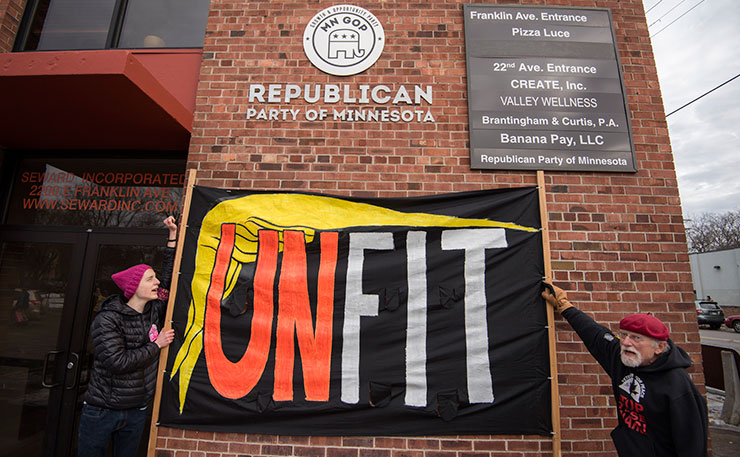
The Cure?
There are certain ailments which cannot be easily treated. This is one of them. The Trump-induced fog clouding the senses of the GOP is not so easily dispelled. The chokehold of billionaire benefactors and the miasma of Fox News will be difficult and painful to shake off.
Yet, there is hope. Over this year, Democrats have seen significant victories in electoral contests at both the state and federal levels – perhaps the most notable of which is Democrat Doug Jones’ astonishing election to the Senate in ruby-red Alabama.
Equally notable is the tsunami of Trump-opposed political activism across the country. People with no prior political inclination are marching down the streets in protest. It is entirely possible this trend may translate into an utter massacre for the GOP in the 2018 mid-term elections. If there is anything which could reconnect the GOP to reality, it is surely the loss of power in Congress, particularly, if such a loss comes as the result of their neglect of the moderate swing-voter to pander to the far-right.
There is hope, too, in the strength of America’s institutions. America is born of the hard work of millions of people over centuries. For all its faults, it is unlikely to be undone by the machinations of one government or broken by a brief period of turbulence.
America may yet survive.
Donate To New Matilda
New Matilda is a small, independent media outlet. We survive through reader contributions, and never losing a lawsuit. If you got something from this article, giving something back helps us to continue speaking truth to power. Every little bit counts.

